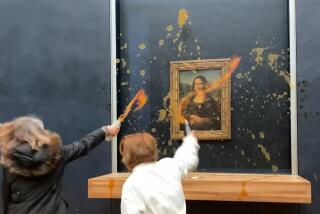Artists Lead the East Germans’ Move for Reform : Europe: Writers, actors and others played sterling roles in the call for political and economic change.
- Share via
EAST BERLIN — A few days ago, a stagehand at the Distel Cabaret pinned a notice on the front door of the popular, satirical theater on Friedrichstrasse.
It announced cancellation of a new political revue scheduled for Tuesday, which had a large advance sale, and asked its loyal audience for their “understanding.”
It candidly explained the reason: “A year ago we were ahead of the times with our political satire. Now we are behind the times--and when we come to terms with the new developments we will let you know.”
While it may have been true that the trenchant, biting script writers and actors at the Distel, or “Thistle,” had lagged behind the lightning events of the past week, East German artists have been in the vanguard of the movement that has shaped those turbulent events.
It was a committee of artists, for instance, that organized the largest demonstration in East Berlin’s postwar history on Nov. 4.
Most of the founders of the New Forum group that has been the point movement in the call for political and economic reforms were associated with the arts and sciences.
New Forum’s leading member is a painter of some note, Baerbel Bohley, whose apartment-studio on Fehrbellinerstrasse has become the unofficial headquarters and meeting place for the group in East Berlin.
But writers, actors, directors and other theatrical people also joined the movement early on and played a sterling role.
The other afternoon, following a tiring rehearsal of a Soviet play by Alexander Vampilov called “The Duck Hunt,” members of the renowned Deutsche Theater gathered in the basement canteen for a snack and a smoke. Among them were actor Thomas Neumann and actress Johanna Schall, granddaughter of playwright Bertolt Brecht.
They sat at a long table with pictures of theatrical personages and scenes from plays on the wall in the flickering light and spoke about artists’ role in the protest that led to the ouster of East German Communist Party boss Erich Honecker and the opening of the Berlin Wall.
“It is said that we were among the first to speak up,” said Neumann. “Why?
“We depend very much on the mood of our audiences, since we are in daily contact with them. We have to feel what is going on.
“So we were aware of the reality in East German society as expressed by the authorities through the media--and by our own, opposite, experience of that reality.”
Schall added: “Since the official media was not telling the truth, the theater had to become a substitute--we took its place as a means of expression.”
Both added that this summer their theatrical and artist colleagues were quick to realize the magnitude of the crisis facing the country because of the flight of refugees.
“There came a point when we decided to declare our position from the stage to the audience,” said Schall.
Many theatergoers were incensed over the rigging of the local elections in May, she said, and increasingly, performers urged their audiences to become activists for change. Resolutions were drafted by the theater people and signed not only by the members of their trade union but by audiences.
They also dispatched open letters to the Communist regime in September calling for various freedoms, particularly that of expression, but received no reply.
Soon various theaters and opera companies, including the one that bears the name of its founder, Brecht, who began at the Deutsche, joined up and held a major meeting in mid-October. They decided to support a mass demonstration in East Berlin.
To their surprise, the government approved their request for a protest meeting which was expected to be a mild affair. But on Nov. 4, a Saturday morning, between 500,000 and 1 million people demonstrated for reform.
The next week, in events undoubtedly fueled by the mass spectacle, was the most politically tumultuous in East Germany’s history, as the Central Committee replaced the Politburo and promised widespread changes, including the opening of the Wall.
Schall, whose mother, Helene Weigel, starred in Brecht’s “Mother Courage” here in 1949, said that as the next step, all forms of censorship must be abolished.
As for the recent, staggering events, Neumann said: “We want to stay in this country, and I am hopeful about the promised reforms. But we don’t have any illusions about the problems accumulated in the last 40 years.
“We have a long way to go--our problems are not just political and economic--but ecological too. It’s something that artists must keep hammering home.”
More to Read
Sign up for Essential California
The most important California stories and recommendations in your inbox every morning.
You may occasionally receive promotional content from the Los Angeles Times.













